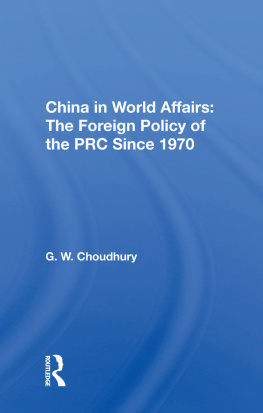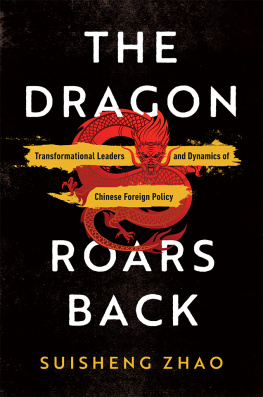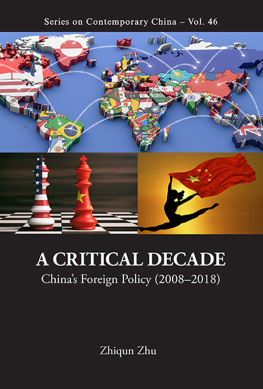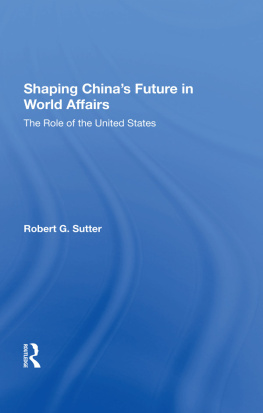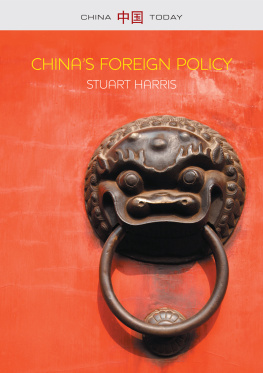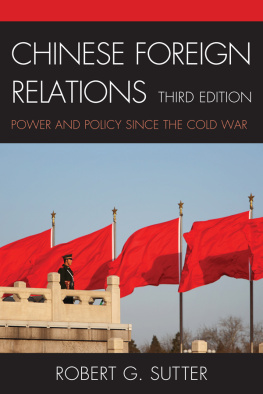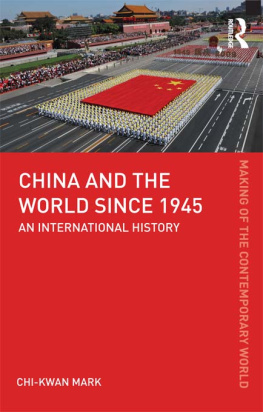China in World Affairs: The Foreign Policy of the PRC Since 1970
Also of Interest from Westview Press
China, the Soviet Union, and the West: Strategic and Political Dimensions for the 1980s, edited by Douglas T. Stuart and William T. Tow
China Among the Nations of the Pacific, edited by Harrison Brown
China: A Political History, 1917-1980, fully revised and updated, Richard C. Thornton
The Chinese Military System: An Organizational Study of the Chinese People's Liberation Army, second edition, revised and updated, Harvey W. Nelsen
China Briefing, 1981, edited by Robert B. Oxnam and Richard C. Bush
Technology, Politics, and Society in China, Rudi Volti
China's Economic Development: Growth and Structural Change, Chu-yuan Cheng
Technology, Defense, and External Relations in China, 1975-1978, Harry G. Gelber
The Chinese Communist Party in Power, 1949-1976, Jacques Guillermaz
Chinese Communist Power and Policy in Xinjiang, 1949-1977, Donald H. McMillen
Treaties of the People's Republic of China, 1949-1978: An Annotated Compilation, Grant F. Rhode and Reid E. Whitlock
From Muskets to Missiles: Politics and Professionalism in the Chinese Army , 1945-1981, Harlan W. Jencks
The Third Indochina Conflict, edited by David W. P. Elliott
The People's Republic of China: A Handbook, edited by Harold C. Hinton
China's Four Modernizations: The New Technological Revolution, edited by Richard Baum
Available in hardcover and paperback.
About the Book and Author
China in World Affairs:
The Foreign Policy of the PRC Since 1970
G. W. Choudhury
This up-to-date textbook reviews China's foreign policy goals since the PRC's active reemergence in world affairs following the Cultural Revolution of 1966-1969. Drawing on original sources and firsthand experience, as well as on a broad academic background, Dr. Choudhury examines China's global policy, diplomatic options, and strategy in the context of the triangular relationship of Washington, Moscow, and Beijing. His discussion-offering numerous unexpected insights-covers China's quest for security, the breakthrough in China-U.S. relations, the course of Sino-Soviet rivalry (particularly in the Asia-Pacific region), the PRC's role in the United Nations since 1971, how China has championed Third World countries, and the new, dynamic elements in post-Mao Chinese foreign policy. The book is current through the summer of 1981.
G. W, Choudhury , professor of political science at North Carolina Central University, has taught at several universities, including Columbia, Johns Hopkins, Duke, Pennsylvania, and Cambridge. He has served as director general for research in the Pakistan Ministry of Foreign Affairs and as a member of the Pakistan cabinet. Author of seven previous books on Asia, Dr. Choudhury has traveled extensively in both the Soviet Union and China.
In memory of my parents,
Golam Mawla and Fatema Choudhury,
and with great affection for my wife, Dilara,
and my sons, Mabud and Sayeed
China in World Affairs: The Foreign Policy of the PRC Since 1970
G. W. Choudhury
First published 1982 by Westview Press, Inc.
Published 2018 by Routledge
52 Vanderbilt Avenue, New York, NY 10017
2 Park Square, Milton Park, Abingdon, Oxon OX14 4RN
Routledge is an imprint of the Taylor & Francis Group, an informa business
Copyright 1982 Taylor & Francis
All rights reserved. No part of this book may be reprinted or reproduced or utilised in any form or by any electronic, mechanical, or other means, now known or hereafter invented, including photocopying and recording, or in any information storage or retrieval system, without permission in writing from the publishers.
Notice:
Product or corporate names may be trademarks or registered trademarks, and are used only for identification and explanation without intent to infringe.
Library of Congress Card Number: 82-60212
ISBN 13: 978-0-367-01899-3 (hbk)
ISBN 13: 978-0-865-31329-3 (pbk)
The book is the result of extensive research on China begun in 1976. I have been interested in doing a work on China's foreign policy ever since 1969, when I had the unique experience of being associated with Pakistani President Yahya Khan's grand assignment, that of acting as "courier" between Beijing and Washington to help initiate the United States' new policy toward the People's Republic of China (PRC). I was involved in the top-secret negotiations for the emerging Sino-American relationship in 1969-1971, which gave me opportunities to study the Chinese perception of the world and, in particular, China's relations with the two superpowers from firsthand and original sources. Although President Nixon used other channels, Pakistani President Yahya became his principal spokesman and, in the final stages, the sole "go-between" linking Beijing and Washington. President Yahya took me into his confidence and allowed me to accompany him to China in November 1970 while the Sino-American negotiations were making good progress. Before his death in 1980, President Yahya gave me a copy of all of the correspondence channeled through him to President Nixon and Premier Zhou Enlai.
My plan to do a major work on China was, however, postponed when I became a "political refugee" as a result of the tragic happenings in the South Asian subcontinent in 1971. I eventually came to the United States and joined my alma mater, Columbia University, where I did research and taught for two years (1972-1974). I was then made a Fellow at the Research Institute on Communist Affairs (RICA), headed by Dr. Zbigniew Brzezinski, who helped me greatly in my research through his deep understanding of the Communist world. I was fortunate to continue my link with Dr. Brzezinski when he moved to the White House in 1976 as President Carter's national security adviser and, more important, the chief mover in the development of the Sino-American relationship. If President Nixon is to be credited for opening the "China door" for the United States, Dr. Brzezinski is to be credited for bringing that relationship to its fullest development in 1979. I must, however, hasten to add that the views expressed in this book should in no way be attributed to Dr. Brzezinski either directly or indirectly. I only wish to thank him for his kind gestures toward me.
I began to work on China's role in world affairs in 1976 after completing India, Pakistan, Bangladesh, and the Major Powers, in which I discussed China's role in Asia, in particular, in South Asia. Dr. Gaston Sigur, director of the Institute for Sino-Soviet Studies at George Washington University, made me a Fellow of his institute in 1976 before I left on my second trip to the PRC, and I am thankful to Dr. Sigur for his help in my work.
I must also express my sincere thanks and appreciation tor the generous research grants I received for three successive years (1976 1978) from the Earhart Foundation, which enabled me to make three trips to the PRC. The president of the foundation, Richard A. Ware, and its secretary and program officer, Anthony T. Sullivan, were extremely helpful. For my final trip to the PRC in connection with this book, I got a grant from the Mary Duke Biddle Foundation, to which I was introduced by my esteemed friend, William L. Bondurant. I must thank him and Mrs. James H. Semans for the research grant I received in 1979.

